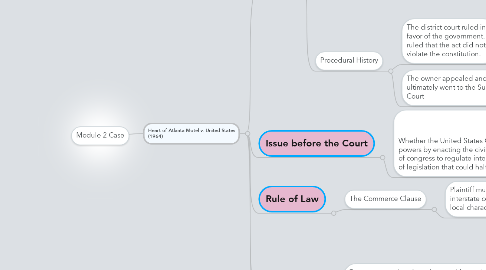
1. Heart of Atlanta Motel v. United States (1964)
1.1. Facts
1.1.1. Parties
1.1.1.1. Heart of Atlanta Motel
1.1.1.2. United States Federal Government
1.1.2. What happened
1.1.2.1. The owner of Heart of Atlanta Motel in Atlanta , in violation of the Civil Rights Acts of 1964, refused to rent room to African-Americans
1.1.2.1.1. The motel owner brought action in the federal district court to have the Civil Rights Act declared unconstitutional on the ground that congress had exceeded its constitutional powers to regulate commerce by enacting the statute
1.1.2.2. The owner argued that his motel was not engaged interstate commerce.
1.1.2.2.1. The owner contended that his motel was "purely of local character.
1.1.2.2.2. The motel however was accessible to state and interstate highways and the owner advertised nationally, had billboards throughout the state and accepted out of state guests
1.1.3. Procedural History
1.1.3.1. The district court ruled in favor of the government. It ruled that the act did not violate the constitution.
1.1.3.1.1. The court determined that the act did not violate the constitution
1.1.3.1.2. The court prohibited the owner from discrimnination
1.1.3.2. The owner appealed and the court ultimately went to the Supreme Court
1.1.3.2.1. Branham brought a product liability - design defect claim against Ford
1.2. Issue before the Court
1.2.1. Whether the United States Congress exceeded its constitutional powers by enacting the civil right law. And further, whether the power of congress to regulate interstate commerce permitted the enactment of legislation that could halt discriminatory practices.
1.3. Rule of Law
1.3.1. The Commerce Clause
1.3.1.1. Plaintiff must show that the motel does not affect interstate commerce because it is allegedly "purely of local character".
1.3.1.1.1. Consumer Expectation Test
1.3.1.1.2. Risk Utility Test
1.4. Application
1.4.1. Owner argues that since the motel is purely of local character, it does not affect interstate commerce and therefore attempts to compel it to not discriminate African Americans (in accordance with the commerce clause) is unconstitutional.
1.4.1.1. The court disagreed with the owner's claim and observed that the discrimination had a quantitative effect on the interstate travel of African Americans, and that this had the effect of discouraging travel on the a sizable portion of the African American community.
1.4.1.2. The court listened to testimony of the Under Secretary of Commerce who stated that discriminatory practices in terms of accommodation against African Americans were widespread nationally
1.5. Conclusion
1.5.1. The US Supreme Court upheld the constitutionality of the Civil Rights Act of 1964. It further ruled that the power of congress to regulate interstate commerce permitted the enactment of legislation that could halt local discriminatory practices.
